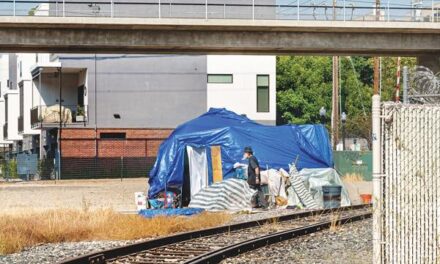To introduce his strong mayor proposal to voters, Darrell Steinberg needed to answer a simple question: Why?
Voters rejected strong mayor in 2014. There was no call to resurrect the idea in 2020 amid a pandemic and social unrest. Changing the city charter is complex. The process demands comprehensive public debate and a vote of the people. Steinberg had time for just two City Council meetings before the door closed on Nov. 3 ballot initiatives.
As the mayor pushed forward, the question remained: Why?
To explain his motivation, Steinberg settled on George Floyd, the African American man killed by Minneapolis police in May. “It was around that period of time I really began thinking about it,” Steinberg says.
Steinberg believes many residents hold him responsible for the social unrest in Sacramento after Floyd’s death. If he is being held accountable, he should have real power, not the minimal authority granted mayors under the city’s 1921 charter, Steinberg reasons.
While he may be sincere in appropriating Floyd as motivation for political change, Steinberg was thinking about strong mayor long before the murder in Minneapolis. In May 2019, he ordered a poll to test support for an executive mayor governing system. The results were dismal. Steinberg backed away.
Regardless, voters now face the fifth iteration of an idea that won’t go away. I worked on three strong mayor proposals as special assistant to Mayor Kevin Johnson, who spent six years trying to become strong mayor.
During my time at City Hall, the best advice we received from actual strong mayors was to let the proposal take effect with the next mayor, thus removing any personal interests. Johnson ignored the advice. So has Steinberg.
During his first six years in office, Johnson went to extreme lengths to sell strong mayor. He met with hundreds of community members. He held town halls and office hours. He believed if people could hear his ideas, they would see the wisdom of strong mayor. Steinberg has a much tighter deadline and far fewer opportunities. The City Council placed Steinberg’s measure on the ballot Aug. 4, just two months before voters begin casting ballots.
Unlike Johnson, Steinberg is trying to link strong mayor to concepts designed to appeal to progressive voters. The strong mayor package includes requirements for equity and gender reviews of ordinances. Commissions for ethics and fair housing would be created. Forty million dollars would be taken from the budget annually for the undefined concepts of “inclusive economic development” and youth.
Steinberg says strong mayor is intended to help distressed neighborhoods. Comfortable neighborhoods don’t need strong mayor, he says. The current city charter is focused on operational needs, not human needs, he suggests. Under his campaign strategy, Steinberg hopes more affluent voters will agree to deliver more money to neglected neighborhoods. The strong mayor will act as a catalyst for this new form of civic equity.
Unfortunately for Steinberg, the City Council members who represent the city’s historically neglected neighborhoods oppose strong mayor. Larry Carr of Meadowview and Allen Warren of Del Paso Heights voted against placing Steinberg’s initiative on the ballot. They criticized the mayor’s timing and goals. Incoming member Katie Valenzuela, who will be the council’s youngest and most progressive member, also opposes strong mayor.
As medium-sized cities go, Sacramento is often cited as a best-practice example. The budget is balanced. Solid managers guide municipal departments. The City Council functions with consistency and stability. There are big problems—the pandemic has destroyed large chunks of the economy, homelessness is rampant and city pension plans are unfunded. But moving to strong mayor won’t solve those problems.
California has 468 cities with governing systems similar to Sacramento. Five have strong mayor—Los Angeles, Oakland, San Francisco, San Diego and Fresno. Strong mayors have not spared those cities from malfunction and corruption.
Once again, Sacramento voters will decide if they want to join the lineup.
Strong Mayor: What It Would Do
Two words sum up Darrell Steinberg’s ambition: strong mayor. To accomplish his goal of becoming Sacramento’s first executive mayor, Steinberg wants voters to approve the most complex rewrite of the City Charter in 99 years.
The Sacramento Mayoral Accountability and Community Equity Act of 2020 does much more than make Steinberg the city’s president and CEO. In language spread across 22 pages, the proposal seeks to reconfigure city government.
Here are highlights of the initiative, which appears on the Nov. 3 ballot:
- Mayor is accountable to public but doesn’t have to attend City Council meetings.
- Mayor approves or vetoes council actions. Council can override veto.
- Mayor hires city manager with council approval.
- Mayor produces annual budget. Council approves budget. Mayor can veto changes made by council. Council can override veto.
- Budget to include $40 million for “inclusive economic development” and youth.
- New City Council committee evaluates decisions for equity. City auditor reviews equity policies.
- Limits mayor to two four-year terms. (Steinberg is already in second term, but would start fresh).
- Creates new ninth City Council district in 2022.
- Establishes ethics commission to review complaints against city officials.
- Establishes fair housing and human rights commission to review policies.
- Takes effect immediately.
- Voters can reconsider strong mayor in 2030 or sooner with City Council approval.
R.E. Graswich can be reached at regraswich@icloud.com. Follow us on Facebook, Twitter and Instagram: @insidesacramento.















